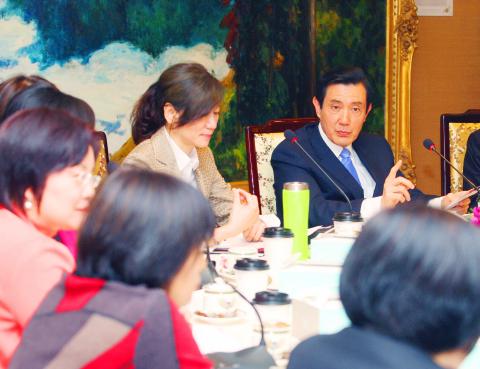President Ma Ying-jeou (馬英九) yesterday met representatives of Mom Loves Taiwan, an association of mothers against nuclear power, at the Presidential Office for a hearing on nuclear safety.
The association was founded by several female public figures and celebrities, including Fubon Cultural and Educational Foundation board director Irene Chen (陳藹玲). Representatives who attended the meeting included Taiwan Foundation for Rare Disorders chairperson Serena Chen (陳莉茵), Taipei Parents’ Association member Chang Yu-huei (常玉慧) and others, as well specialists.
When the association was established earlier this year, it said its main goals were to make Taiwan Power Co (Taipower, 台電) disclose all the facts about safety at nuclear power plants, become a platform for civic discussion, demand all dangerous nuclear plants stop operation, stop the construction of the Fourth Nuclear Power Plant and review and discuss new energy policies.

Photo: CNA
The Presidential Office said on Friday that before the national anti-nuclear protest on March 9, the office had already noticed that the public was concerned about nuclear safety and began making contact with civic groups, hoping to communicate with them.
Before the meeting, Irene Chen said the association would present four requests, including information disclosure, comprehensive re-evaluation of all nuclear power plants, new energy policies and that the Fourth Nuclear Power Plant issue not be decided by referendum.
Irene Chen said the association is not an anti-nuclear group, but aims to monitor, question and disseminate correct information on nuclear safety so people can make informed decisions. However, she said the safety of the Fourth Nuclear Power Plant is a big concern.
Ma said the government’s nuclear power policy is to “ensure nuclear safety, steadily reduce [the use of] nuclear power, create a green low carbon environment and gradually achieve a nuclear-free homeland.”
However, the goal must be achieved without power rationing, while maintaining reasonable electricity rates and abiding by international commitments on carbon reduction, he said.
As to the disposal of nuclear waste, Atomic Energy Council (AEC) Minister Tsai Chuen-horng (蔡春鴻) said there are about 80 low-radiation final disposal sites in the world, so the technology to achieve it should not be a problem, and spent fuel pools or deep underground storage for highly radioactive fuel rods are being planned.
Responding to concerns about the high population density in Greater Taipei near three nuclear power plants, as mentioned in the journal Nature in 2011, Premier Jiang Yi-huah (江宜樺) said it was a misunderstanding and the article highlighted the culture of safety and safety procedures rather than the density of the nearby population.
National Tsing Hua University nuclear engineering professor Yu Ge-ping (喻冀平) said nuclear power plants around the world are located within 75km of high population areas because the power demands are higher in these areas, and population density in these areas is not directly connected to nuclear safety.
However, several representatives were not satisfied with those answers and said the threat posed by radiation to people in a 20km range is different than posed to people within 75km, and “we care about the people [in this area].”

CHAOS: Iranians took to the streets playing celebratory music after reports of Khamenei’s death on Saturday, while mourners also gathered in Tehran yesterday Iranian Supreme Leader Ayatollah Ali Khamenei was killed in a major attack on Iran launched by Israel and the US, throwing the future of the Islamic republic into doubt and raising the risk of regional instability. Iranian state television and the state-run IRNA news agency announced the 86-year-old’s death early yesterday. US President Donald Trump said it gave Iranians their “greatest chance” to “take back” their country. The announcements came after a joint US and Israeli aerial bombardment that targeted Iranian military and governmental sites. Trump said the “heavy and pinpoint bombing” would continue through the week or as long

TRUST: The KMT said it respected the US’ timing and considerations, and hoped it would continue to honor its commitments to helping Taiwan bolster its defenses and deterrence US President Donald Trump is delaying a multibillion-dollar arms sale to Taiwan to ensure his visit to Beijing is successful, a New York Times report said. The weapons sales package has stalled in the US Department of State, the report said, citing US officials it did not identify. The White House has told agencies not to push forward ahead of Trump’s meeting with Chinese President Xi Jinping (習近平), it said. The two last month held a phone call to discuss trade and geopolitical flashpoints ahead of the summit. Xi raised the Taiwan issue and urged the US to handle arms sales to

State-run CPC Corp, Taiwan (CPC, 台灣中油) yesterday said that it had confirmed on Saturday night with its liquefied natural gas (LNG) and crude oil suppliers that shipments are proceeding as scheduled and that domestic supplies remain unaffected. The CPC yesterday announced the gasoline and diesel prices will rise by NT$0.2 and NT$0.4 per liter, respectively, starting Monday, citing Middle East tensions and blizzards in the eastern United States. CPC also iterated it has been reducing the proportion of crude oil imports from the Middle East and diversifying its supply sources in the past few years in response to geopolitical risks, expanding

Pro-democracy media tycoon Jimmy Lai’s (黎智英) fraud conviction and prison sentence were yesterday overturned by a Hong Kong court, in a surprise legal decision that comes soon after Lai was jailed for 20 years on a separate national security charge. Judges Jeremy Poon (潘兆初), Anthea Pang (彭寶琴) and Derek Pang (彭偉昌) said in the judgement that they allowed the appeal from Lai, and another defendant in the case, to proceed, as a lower court judge had “erred.” “The Court of Appeal gave them leave to appeal against their conviction, allowed their appeals, quashed the convictions and set aside the sentences,” the judges